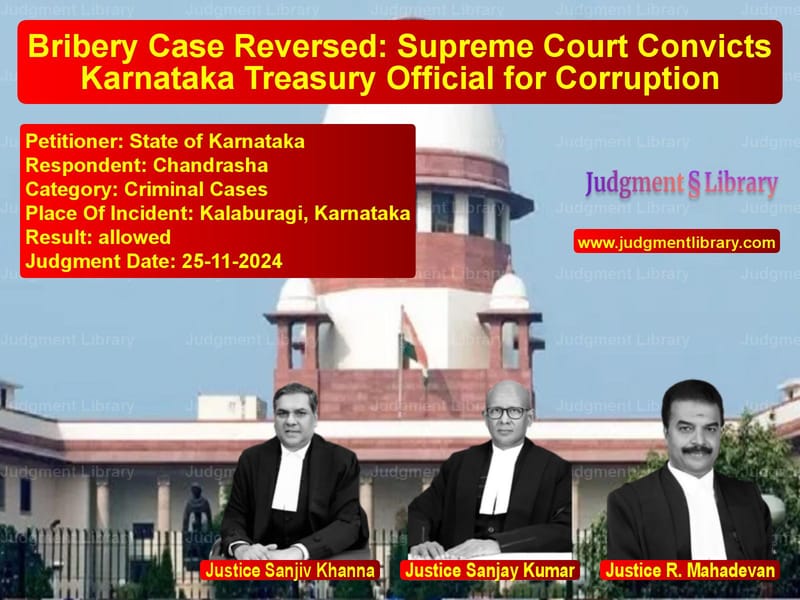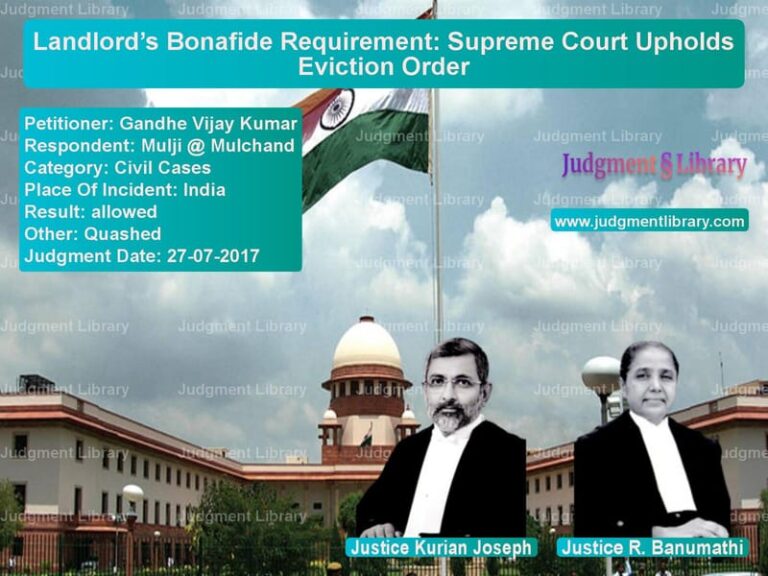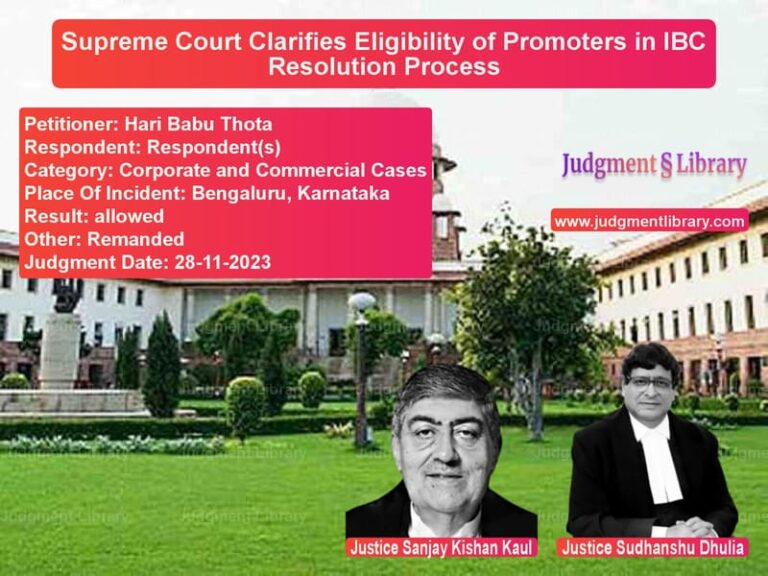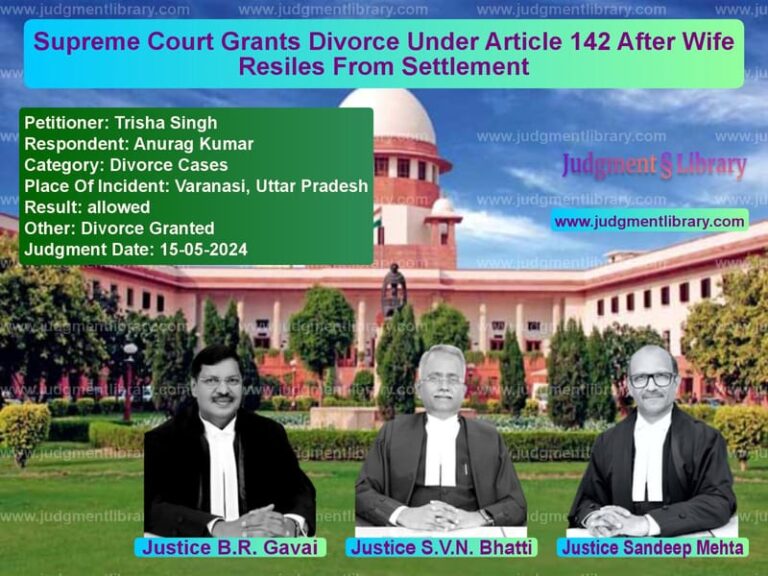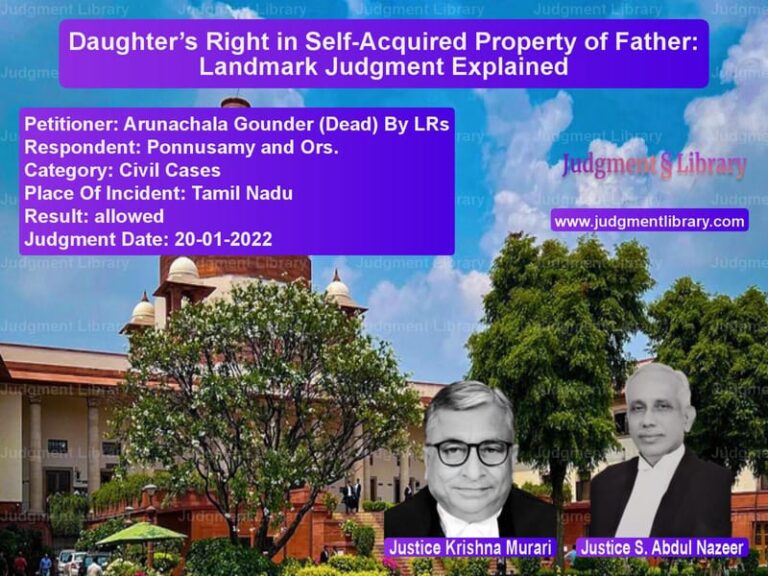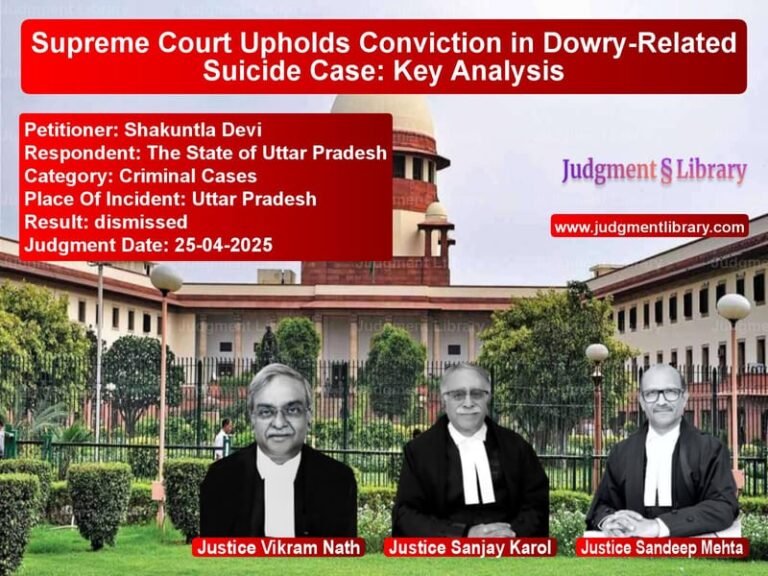Bribery Case Reversed: Supreme Court Convicts Karnataka Treasury Official for Corruption
In a crucial judgment, the Supreme Court of India overturned an acquittal by the Karnataka High Court, reinstating the conviction of a First Division Assistant in a bribery case. The case, State of Karnataka vs. Chandrasha, involved a government official accused of demanding and accepting a bribe of Rs. 2,000 to process a bill related to surrender leave salary. The Supreme Court ruled that the High Court erred in setting aside the conviction and emphasized that once the demand and acceptance of a bribe are proven, conviction under the Prevention of Corruption Act, 1988, must follow.
Background of the Case
The case began with a complaint by Subhashchandra S. Alur (P.W.1), a Second Division Assistant at Shri Mahanteshwar High School in Karnataka. On July 29, 2009, Alur submitted a bill for encashment of surrender leave salary for himself and three other non-teaching staff members to the Sub-Treasury Office in Afzalpur, Karnataka. The bill was processed by Chandrasha, a First Division Assistant in the treasury office, who allegedly refused to pass the bill without a bribe of Rs. 500 per employee (totaling Rs. 2,000).
Allegations and Trap
- The complainant alleged that Chandrasha routinely demanded bribes to process bills.
- On July 30, 2009, Alur recorded a conversation with Chandrasha using a tape recorder provided by the Lokayukta Police.
- On August 5, 2009, a trap was set, and Chandrasha was caught red-handed accepting Rs. 2,000.
- The bribe money, treated with phenolphthalein powder, was recovered from his pocket.
Trial Court Conviction
Based on the evidence, the Principal Sessions Judge, Kalaburagi, convicted Chandrasha under Sections 7 and 13(1)(d) read with Section 13(2) of the Prevention of Corruption Act, 1988. The trial court sentenced him to:
- Six months of imprisonment and a fine of Rs. 2,500 for the offense under Section 7.
- Two years of imprisonment and a fine of Rs. 5,000 for the offense under Section 13(1)(d).
- Both sentences were to run concurrently.
High Court Acquittal
On appeal, the Karnataka High Court reversed the conviction, reasoning that:
- The bill had already been passed on July 29, 2009, and a cheque was prepared on July 30, 2009.
- As of the date of the alleged trap (August 5, 2009), no work was pending with Chandrasha.
- There was insufficient evidence to prove that the money received was a bribe.
Supreme Court’s Analysis and Verdict
The Supreme Court examined the case and found multiple errors in the High Court’s reasoning.
Key Observations
- The cheque, although prepared on July 30, was never issued to the complainant.
- The complainant was never informed that the bill had been passed.
- The tape-recorded conversation and witness testimonies proved the demand and acceptance of a bribe.
- Chandrasha failed to provide a credible explanation for possessing the marked bribe money.
- The burden to rebut the presumption under Section 20 of the Prevention of Corruption Act was on the accused, which he failed to do.
Judgment Excerpts
The Supreme Court reiterated:
“The two basic facts—‘demand’ and ‘acceptance’ of gratification—having been proved, the presumption under Section 20 of the Prevention of Corruption Act must be invoked.”
The Court further ruled:
“Once the prosecution establishes demand and acceptance of a bribe, the accused must provide a satisfactory explanation, failing which conviction must follow.”
Final Ruling
The Supreme Court set aside the High Court’s acquittal and reinstated the trial court’s conviction. Chandrasha was directed to serve the remainder of his sentence.
Impact of the Judgment
The ruling has broad implications:
- Strengthening anti-corruption enforcement: Public servants will face stricter scrutiny in bribery cases.
- Reaffirming evidentiary standards: Recorded conversations and marked money are strong proof of bribery.
- Clarifying the burden of proof: Once bribe acceptance is proven, the accused must rebut the presumption of guilt.
Conclusion
The Supreme Court’s ruling in State of Karnataka vs. Chandrasha reinforces the legal principle that demand and acceptance of a bribe, once proven, lead to conviction unless effectively rebutted. The judgment strengthens India’s anti-corruption laws by holding public officials accountable for their misconduct.
Petitioner Name: State of Karnataka.Respondent Name: Chandrasha.Judgment By: Justice Sanjiv Khanna, Justice Sanjay Kumar, Justice R. Mahadevan.Place Of Incident: Kalaburagi, Karnataka.Judgment Date: 25-11-2024.
Don’t miss out on the full details! Download the complete judgment in PDF format below and gain valuable insights instantly!
Download Judgment: state-of-karnataka-vs-chandrasha-supreme-court-of-india-judgment-dated-25-11-2024.pdf
Directly Download Judgment: Directly download this Judgment
See all petitions in Fraud and Forgery
See all petitions in Money Laundering Cases
See all petitions in Public Sector Employees
See all petitions in Judgment by Sanjiv Khanna
See all petitions in Judgment by Sanjay Kumar
See all petitions in Judgment by R. Mahadevan
See all petitions in allowed
See all petitions in supreme court of India judgments November 2024
See all petitions in 2024 judgments
See all posts in Criminal Cases Category
See all allowed petitions in Criminal Cases Category
See all Dismissed petitions in Criminal Cases Category
See all partially allowed petitions in Criminal Cases Category

